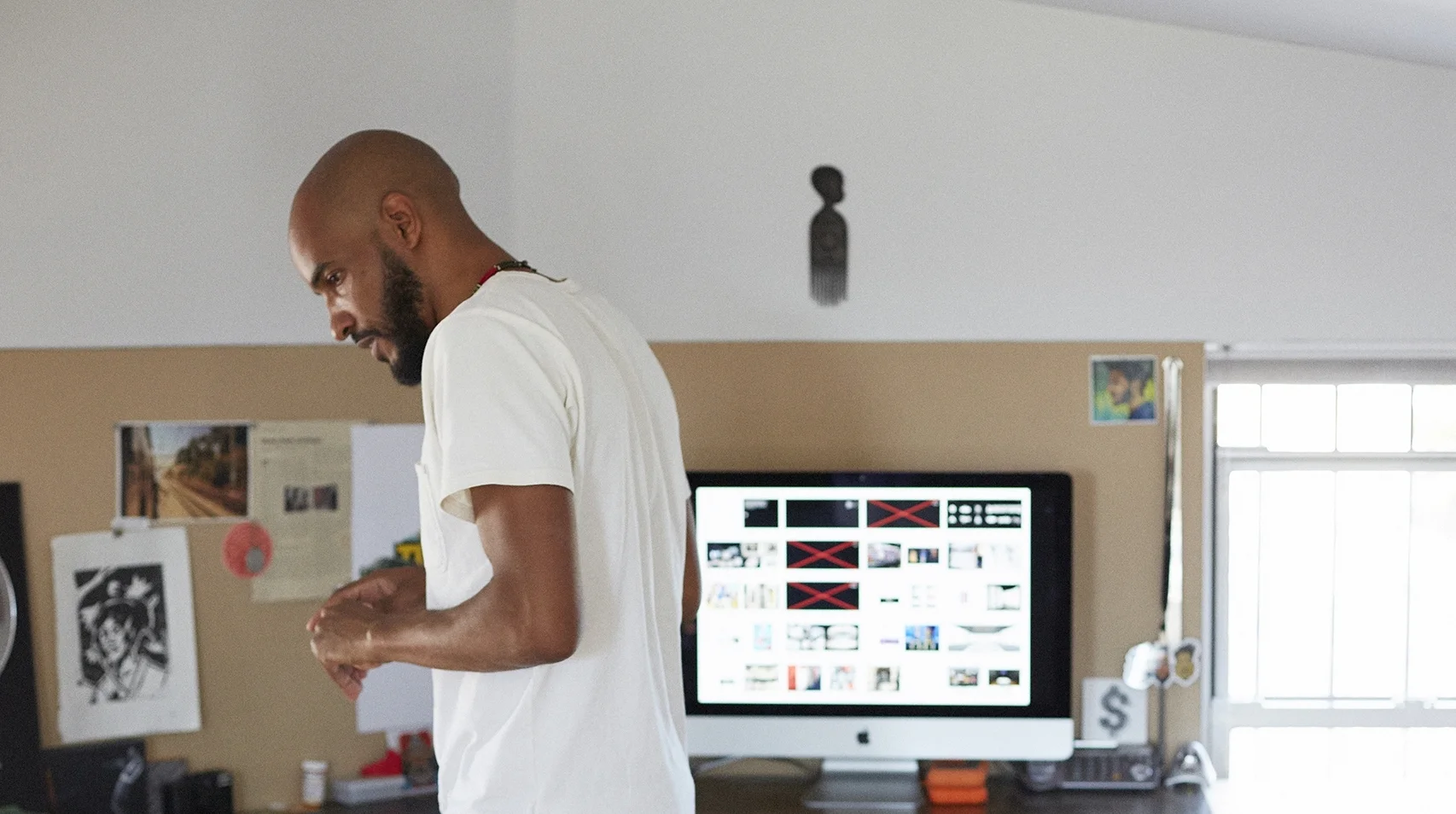WORDS: Eric Buron & Hannah Haworth
The ceiling is low in Andrew’s studio, with pipes running the length of the room. Andrew stands over six feet tall. “It’s not good for my posture,” he says with a bit of a smile.
The radio plays softly in this basement space which is bright, simple, clean, and filled with projects from bronze magazine racks to newly minted leather slippers. There are three industrial sewing machines, shelves of precut leather, large wooden worktables, an early American banjo, and on one shelf sits a heat press with a stamp of his makers mark. The “E” is for Edward, his middle name and the name of his father and great grandfather.
The house he grew up in was built in 1845, and while it had electricity and plumbing, it needed work. His mother, a keen gardener, made curtains for the house, reupholstered pillows and cushions, and stripped down old furniture and repainted it. There was a barn in back where his father, a printer, worked on projects. He was raised by doers. He would watch stuff happen, listen to their instructions, and help out when he could.
Andrew’s great, great grandfather was an 1840’s German immigrant. He built a knitting factory, made socks during the Civil War, and went on to manufacture other accessories, undergarments, hoop skirts, corsets, and suspenders. A framed design for these suspenders hangs on the wall, which Andrew has used to manufacture his own.
Andrew does his cutting and metalworking in Connecticut and glues, sews, and assembles here in Astoria, Queens. “Two or three days of cutting will give me two or three weeks of work.”
A seventh generation New Yorker, Andrew was born on 77th street and grew up on Long Island. He started wood working when he was very young, describing himself as being a “weird little kid.” He didn’t like the toys that were commonly available- one of his earliest projects was a wooden astrolabe he built in the first or second grade. As he grew up, he spent a lot of time in France- from there he travelled to Germany, the Czech Republic, and Italy, among other places.
One summer, Andrew spent bicycling and camping through Sweden. While travelling, he would experiment with packing and carrying gear. First he rolled up blankets in rope, then he built a sling. He’d carry two side bags as opposed to a backpack and play around with weight distribution.
In Europe, he says, they have “different ways of doing stuff, they have more of a tradition of craft that they’re still in tune with.” While hiking, his boots wore through, he found a cobbler who let him watch as they fit new toe taps and heel irons.
Andrew shared a historic example of this approach "Noble women of the 18th century were only taught lace work and embroidery so that when they were having the work done for them, they would know the difference in the quality of work. They would know what to look for. Nowadays, people don’t know any better.”
“When people are so disconnected from actually making objects, you lose touch with how well made objects should be. The details are lost.”
"Simple, cost effective, and something that’s going to fill a day to day need." That’s his focus. He remarked that the holidays are coming up and if he’s not getting it done, no one is. As he works he finds himself musing over other projects he’d like to do and previous projects he’d like to improve on.
Taking a break means making something else… a wallet with a zip pouch for instance. He built a functional 1840’s camera, a copy of one of the earliest cameras ever made, inspired by those he visited at the George Eastman House.
Next he’d like to make a letter opener, "I'm sick of opening my mail like a barbarian!" The blade will be modelled after a Bronze Age sword.
“The history of objects, is the history of humanity.”
“I mean… that’s what brings us to first manipulate our environment, you know, things that we needed to make our life easier. And once they’ve served a purpose, we decorate them. We take things and make them our own."
Andrew’s goal is to eventually expand into a storefront, where he can sell his ready made goods with all manufacturing done on premises. Here, there would be opportunity to collaborate further with his clients to make customized goods suited to an individual’s needs- made to measure luggage, for instance. He’d like a more extensive workshop outside of NYC where he can house a foundry, wood-working capabilities, and everything else that's impractical and difficult to do in the city.
“I commented to my dad one time… he asked me if I was happy doing this, and I was like… well, it’s stressful and it’s got its ups and downs and there are definitely aspects of it that I don’t like… but I feel like it’s what I’m supposed to be doing.”
About MakersFinders
MakersFinders is a social platform that helps people share and sell what they make and find what they love.
We have an app in private beta. We publish stories. We host events. And provide quarterly grants for our community of Makers and Finders.






























